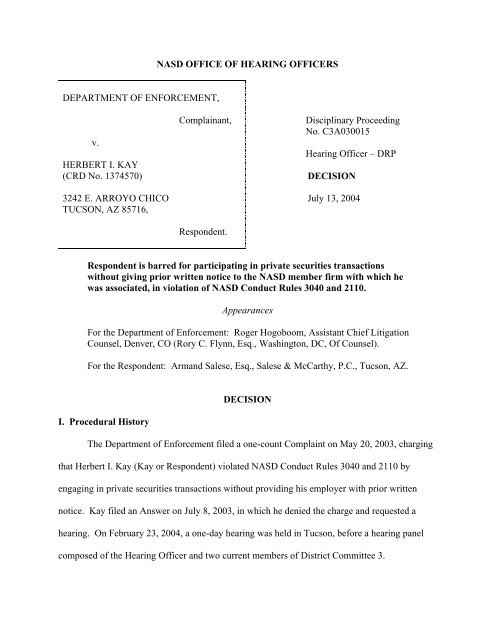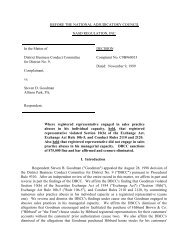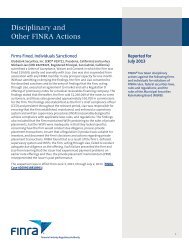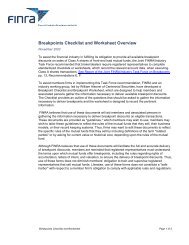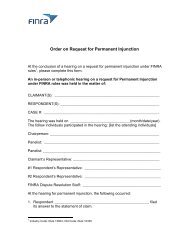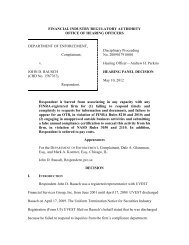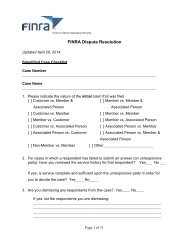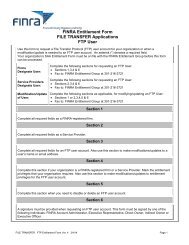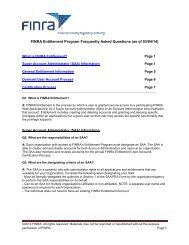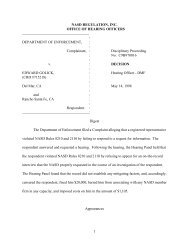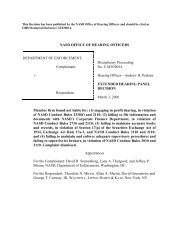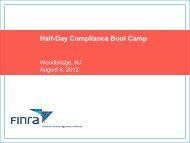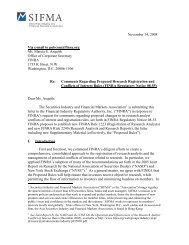NASD OFFICE OF HEARING OFFICERS - finra
NASD OFFICE OF HEARING OFFICERS - finra
NASD OFFICE OF HEARING OFFICERS - finra
You also want an ePaper? Increase the reach of your titles
YUMPU automatically turns print PDFs into web optimized ePapers that Google loves.
<strong>NASD</strong> <strong><strong>OF</strong>FICE</strong> <strong>OF</strong> <strong>HEARING</strong> <strong><strong>OF</strong>FICE</strong>RSDEPARTMENT <strong>OF</strong> ENFORCEMENT,v.HERBERT I. KAY(CRD No. 1374570)3242 E. ARROYO CHICOTUCSON, AZ 85716,Complainant,Respondent.Disciplinary ProceedingNo. C3A030015Hearing Officer – DRPDECISIONJuly 13, 2004Respondent is barred for participating in private securities transactionswithout giving prior written notice to the <strong>NASD</strong> member firm with which hewas associated, in violation of <strong>NASD</strong> Conduct Rules 3040 and 2110.AppearancesFor the Department of Enforcement: Roger Hogoboom, Assistant Chief LitigationCounsel, Denver, CO (Rory C. Flynn, Esq., Washington, DC, Of Counsel).For the Respondent: Armand Salese, Esq., Salese & McCarthy, P.C., Tucson, AZ.DECISIONI. Procedural HistoryThe Department of Enforcement filed a one-count Complaint on May 20, 2003, chargingthat Herbert I. Kay (Kay or Respondent) violated <strong>NASD</strong> Conduct Rules 3040 and 2110 byengaging in private securities transactions without providing his employer with prior writtennotice. Kay filed an Answer on July 8, 2003, in which he denied the charge and requested ahearing. On February 23, 2004, a one-day hearing was held in Tucson, before a hearing panelcomposed of the Hearing Officer and two current members of District Committee 3.
At the commencement of the hearing, Respondent admitted all allegations in theComplaint. Enforcement briefly questioned Respondent, then moved for summary dispositionpursuant to <strong>NASD</strong> Procedural Rule 9264. The Hearing Panel granted Enforcement’s motion,which Respondent did not oppose, because there was no genuine issue of material fact andEnforcement was entitled to summary disposition as a matter of law.Thus, the only remaining issue at the hearing was the sanction to be imposed.Enforcement offered nineteen exhibits, which were admitted in evidence, and the Respondenttestified on his own behalf. 1On March 19, 2004, the parties filed post-hearing briefs.II. Findings of Fact and Conclusions of LawA. JurisdictionKay was registered with <strong>NASD</strong> member Linsco/Private Ledger Corporation (LPL) as ageneral securities representative and general securities principal from March 16, 1995 until hisregistration was terminated on December 20, 2000. He is currently registered with anothermember firm. 2B. Amigos offeringOn March 3, 2000, Respondent co-founded (with MS) Amigos Investment I, L.L.C.(Amigos), an Arizona limited liability company, in order to acquire an interest in, and developfor residential use, approximately 10 acres in Puerto Penasco, Sonora, Mexico. On March 8,2000, Amigos commenced a private placement of securities, offering equity ownership in the1 References to the hearing transcript are noted as Tr. Enforcement’s exhibits are cited as CX; Respondent did notoffer any exhibits.2 CX-1. Respondent is subject to <strong>NASD</strong> jurisdiction, because he was registered with a member firm at the time ofthe alleged violation and when Enforcement filed the Complaint.2
form of 250 to 400 units, at a cost of $10,000 per unit, with a minimum investment of $50,000.(CX-2, pp. 1, 8.)Once acquired, title to the property was to be held by a Mexican company thatRespondent and MS owned. Though Respondent and MS had no experience developing ormanaging commercial real estate, the property was to be developed, marketed and sold by twoother Mexican companies that Respondent and MS also owned. Respondent and MS were toreceive as compensation an “organization and acquisition fee” of $300,000, a monthly propertymanagement fee of $16,667.67, and five percent commission from the sale of each townhousebuilt on the property. The investment involved a “high degree” of risk, there was no market forthe units, and Respondent and MS stood to make substantial profits even if the project wereunsuccessful. All of this information was disclosed in the private placement memorandum.(CX-2, pp. 1, 8, 9, 14, 15, 16, 17.)From March to May 2000, Respondent sold 290 units to 24 investors, raising a total of$2.9 million. All but two investors were LPL customers whose accounts were handled byRespondent. Respondent admits he did not provide written notice to LPL regarding the Amigosoffering, but until the morning of the hearing, claimed he had verbally informed his firm of theselling activity. At the hearing, he recanted and admitted he had never informed LPL that he wassoliciting customers to invest in Amigos and had lied to <strong>NASD</strong> throughout the investigation.(Tr. 13, 25, 43-48; CX-3, CX-4, CX-5, CX-7, CX-8.)Once LPL discovered Respondent’s involvement with Amigos, the firm instructedRespondent to return all money to the investors. 3After Respondent complied with this directive,his employment with LPL was terminated. Respondent testified that he received no3 After learning of Kay’s involvement in Amigos from another broker-dealer, LPL conducted a surprise audit ofRespondent’s office. No records regarding Amigos were found, but Respondent admitted that he had participated inthe Amigos offering without notifying LPL. CX-9.3
compensation from Amigos, and investors lost no money. 4Respondent admitted to the Panelthat he had made a mistake by failing to tell his firm about Amigos and conceded he took a“calculated risk” that LPL would not uncover his activity. (Tr. 13, 27-29; CX-9.)C. Private Securities Transactions<strong>NASD</strong> Conduct Rule 3040 prohibits an associated person from participating in privatesecurities transactions (“selling away”) without prior detailed written notice to his or her firm.Rule 3040 defines a “private securities transaction” as “any securities transaction outside theregular course or scope of an associated person’s employment with a member, including, thoughnot limited to, new offerings of securities which are not registered with the Commission.”Where a broker may receive selling compensation, the member firm must respond to thenotice in writing indicating whether it approves or disapproves of the person’s participation inthe proposed transaction. If the member approves the transaction, the member must record thetransaction in its books and records and supervise the associated person’s participation in thetransaction as if the transaction had been executed by the member firm.problematic:The SEC has explained why transactions concealed from a broker’s employer areThe regulatory scheme under the Exchange Act, in which the <strong>NASD</strong> is assigned avital role, imposes on broker/dealer entities and <strong>NASD</strong> member firms theresponsibility to exercise appropriate supervision over their personnel for theprotection of investors. Where employees effect transactions for customersoutside of the normal channels and without disclosure to the employer, the publicis deprived of protection which it is entitled to expect. Moreover, the employer4 After he left LPL, Respondent moved to another member firm. He testified that he provided written notice to thenew firm regarding Amigos, and 23 of the original 24 investors purchased units in the new offering. Respondentfurther testified that the project was then delayed for several reasons, including problems obtaining additionalfinancing. To that end, Respondent, MS, and two others formed Sonoran Capital, a Mexican mortgage companymodeled after the Ugly Duckling used car business, which Respondent described as taking a “non-traditionalcollateralized asset… underwrite the loans… securitize them, sell them out the back door, raise capital, leverage it,[then] do it again.” Respondent reported that they were “beginning construction” on the property in late February2004. Tr. 29-35, 50-51.4
may also thus be exposed to risks to which it should not be exposed. Thus, suchconduct is not only potentially harmful to public investors, but inconsistent withthe obligation of an employee to serve his employer faithfully.Anthony J. Amato, Exchange Act Rel. No. 10265, 1973 SEC LEXIS 2769, at **6-7 (June29, 1973) (footnotes omitted).Respondent acknowledges he violated Rule 3040, and the record abundantly supports hisconcession. There is no dispute that the investments in Amigos involved securities or thatRespondent participated in the sales. Respondent conceded that he gave no written notice to hisfirm prior to engaging in these transactions.The Panel finds, and Respondent concedes, that he participated in private securitiestransactions involving the sale of Amigos. The Panel concludes that he did so without firstgiving his firm detailed written notice of his intended participation. Respondent thus violatedRule 3040. Such misconduct also constitutes a violation of <strong>NASD</strong> Conduct Rule 2110, whichrequires the observance of high standards of commercial honor and just and equitable principlesof trade. 5III. Sanctions<strong>NASD</strong> Sanction Guidelines for selling away were revised late last year. 6In addition toslightly modifying the five principal considerations in the previous Guideline, eight new factorswere added. For selling away, the Guidelines recommend a fine of $5,000 to $50,000, withsuspensions that vary in length according to the dollar amount of sales. Here, where the amountis above $1,000,000, the Guidelines recommend a suspension of twelve months to a bar, a periodthat can be increased or decreased based on aggravating or mitigating factors.5 See Stephen J. Gluckman, Exchange Act Release No. 41,628, 1999 SEC LEXIS 1395, *22 (July 20,1999)(citations omitted).6 <strong>NASD</strong> Special Notice to Members 03-65 (Oct. 2003). The changes became effective on December 1, 2003, andapplied to all actions as of that date, including pending disciplinary actions.5
In addition to the dollar amount of sales, adjudicators are to consider twelve other factorswhen determining sanctions in selling away cases: (1) number of customers; (2) length of timeover which the selling away activity occurred; (3) whether the product has been found violativeof federal or state securities laws or federal, state or SRO rules; (4) whether respondent had aproprietary or beneficial interest in or was otherwise affiliated with, the selling enterprise orissuer, and, if so, whether respondent disclosed this information to his customers; (5) whether therespondent attempted to create the impression that his employer sanctioned the activity; (6)whether respondent’s selling away activity resulted, either directly or indirectly, in injury to theinvesting public and, if so, the nature and extent of the injury; (7) whether respondent sold awayto customers of his or her employer; (8) whether respondent provided the member firm withverbal notice of the details of the proposed transaction and, if so, the firm’s verbal or writtenresponse, if any; (9) whether respondent sold the securities after the member firm instructed himor her not to sell the product at issue; (10) whether respondent participated in the sale byreferring customers or selling the product directly to customers; (11) whether respondentrecruited other registered individuals to sell the product; and (12) whether respondent misled hisemployer about the existence of the selling away activity or otherwise concealed the selling awayactivity from the firm. 7In this case, the thirteen factors present a mix of circumstances. Kay’s misconductoccurred over a relatively short period of time. No adjudicator has found that the Amigosoffering violated any other laws. There is no evidence that Kay attempted to create theimpression that his firm backed the activity, or that he recruited other registered persons to sellthe product. Most importantly, no losses were incurred by investors; however, this may havebeen due to LPL’s insistence that Kay refund all the money he had collected.7 Id. at 678-679.6
Most of the principal considerations weigh against Respondent. As noted, the total dollaramount involved in the selling away ($2.9 million) was significant. Kay unquestionably had aproprietary or beneficial interest in the issuer. He served as co-founder and co-manager ofAmigos, as well as co-owner of the three Mexican entities responsible for purchasing,developing and selling the land, though this information was disclosed in the private placementmemorandum. He sold to twenty-four investors; all but two were customers of LPL.Respondent participated in the sales directly by soliciting customers. In some instances, he soldsecurities in a customer’s LPL account in order to fund the purchase of his Amigos venture,which may have posed a conflict of interest.Respondent claimed throughout the investigation and this proceeding -- until the morningof the hearing -- that he had told LPL’s president about the Amigos sales, a conversation that thepresident denied having. 8Respondent finally admitted to the Panel that he had lied, and he hadnot, in fact, provided his firm with verbal notice of details regarding Amigos. He acknowledgedthat he hid the activity from the firm and took a “calculated risk” that LPL would not discoverhis selling away. He declared that he had made a “stupid calculation” that Amigos would “nevercome to light” but agreed there is “no mitigating factor,” because he “knew what [he] wasdoing.” 9 Enforcement contends that a bar is warranted, because Respondent completelydisregarded fundamental standards of ethics, integrity and honesty expected of professionals inthe securities industry. Respondent argues for a less severe sanction and points to cases in whichrespondents received a short suspension and a fine, while attempting to distinguish those cases in8 CX-10, CX-11.9 Tr. 49.7
which respondents were barred. 10Respondent stresses that he accepted responsibility for hiswrongdoing and expressed regret over the violations. He also emphasizes his “exemplarydisciplinary record.” 11The Panel has considered all of the above circumstances, as well as the parties’arguments, and notes that selling away is a serious breach of a registered representative’s duty tothe investing public and to his firm. 12It is critically important that registered representativescomply with Rule 3040 to ensure that investors receive the protections to which they are entitledunder the securities laws and regulations.The Panel finds that Respondent’s misconduct requires a serious sanction. There areseveral aggravating factors, including Respondent’s false claim throughout the investigation thathe had provided verbal notice to his firm of his private transactions. Moreover, Respondent hadbeen previously advised that a similar deal was problematic, yet he chose to proceed withAmigos little more than a year later. In November 1998, Kay was told that he could not engagein a transaction with MS that involved buying land, building a nightclub on the property, andseeking investors, because it could be considered selling away. 13Despite this warning fromLPL, Respondent decided to pursue the Amigos offering in March 2000, then repeatedly lied bystating that he had provided his firm with verbal notice of his selling activity. Though it was10 Appropriate sanctions depend on the facts and circumstances of a particular case and cannot be compared withdisciplinary action taken in other proceedings. Butz v. Glover Livestock Commission Co., 411 U.S. 182, 187(1973)(other citations omitted). Furthermore, the cases cited by Respondent were decided under the priorGuidelines.11 The lack of a disciplinary history is not a mitigating factor. See Dep’t of Enforcement v. Balbirer, Complaint No.C07980011, 1999 <strong>NASD</strong> Discip. LEXIS 29 (NAC Oct. 18, 1999).12 Dep’t of Enforcement v. Roger A. Hanson, Complaint No. C8A000059, 2002 <strong>NASD</strong> Discip. LEXIS 5, at *14(NAC March 28, 2002), citing Dep’t of Enforcement v. Fergus, Complaint No. C8A990025, 2001 <strong>NASD</strong> Discip.LEXIS 3, at *66 (NAC May 17, 2001).13 CX-12.8
certainly better that Respondent eventually admitted he had lied rather than perjure himself at thehearing, his last-minute candor does not serve as a mitigating factor.Finally, Respondent, who was a principal and had supervisory responsibilities at LPL,utterly ignored his firm’s very restrictive policy regarding selling away. LPL completelyprohibited representatives from engaging in “activities that may be deemed to be privatesecurities transactions or selling away,” warning that any violation would be grounds forimmediate dismissal. 14Respondent’s misconduct was deliberate, motivated by his own financial gain, andwithout regard for <strong>NASD</strong> rules or his firm’s policies. He then attempted to conceal hiswrongdoing by lying about it. The Panel finds that a bar is warranted.IV. ConclusionRespondent Herbert I. Kay violated <strong>NASD</strong> Conduct Rules 3040 and 2110 byparticipating in the sale of securities issued by Amigos without prior written notice to the <strong>NASD</strong>member firm with which he was associated. For these violations, Respondent is permanentlybarred from association with any member firm in any capacity. 15Respondent shall pay costs inthe amount of $1,176.84, which includes an administrative fee of $750 and hearing transcriptcosts of $426.84.14 CX-18, p. 3. It appears this policy was put in place in January 2000. When Respondent joined LPL in 1995, hereceived a copy of the firm’s existing policy, which required written notification of and approval by LPL prior toany private securities transactions. CX-13.15 The Hearing Panel has considered all of the arguments of the parties. They are sustained or rejected to the extentthey are in accord or inconsistent with the views expressed herein.9
These sanctions shall become effective on a date set by <strong>NASD</strong>, but not earlier than 30days after this Decision becomes the final disciplinary action of <strong>NASD</strong>.<strong>HEARING</strong> PANEL________________________By: Dana R. PisanelliHearing OfficerDated: July 13, 2004Washington, DCCopies to:Herbert I. Kay (via overnight and first class mail)Armand Salese, Esq. (via facsimile and first class mail)Roger D. Hogoboom, Esq. (via electronic and first class mail)Rory C. Flynn, Esq. (via electronic and first class mail)10


